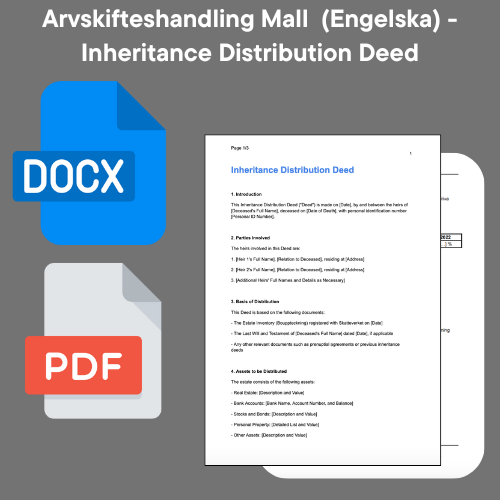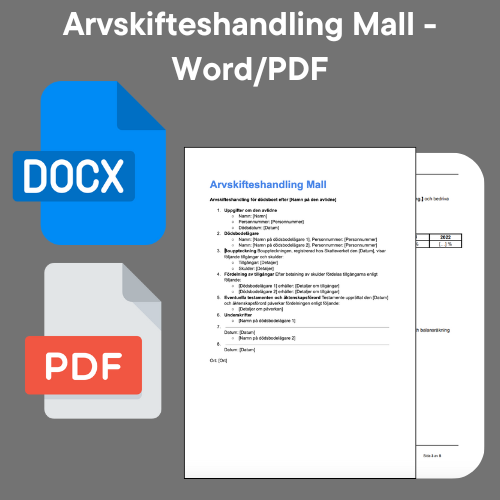Can you keep an inheritance when you have a debt settlement?
Share
What happens to inheritance when you have debt settlement?
Table of contents
- What is debt consolidation?
- What counts as inheritance?
- Does inheritance affect the debt settlement?
- How do you report an inheritance during debt settlement?
- Consequences of not reporting an inheritance
- Is it possible to avoid using the inheritance for the debts?
- Important to consider in case of inheritance during debt settlement
- Conclusion
What is debt consolidation?
To understand how inheritance is affected by debt settlement, it is first important to understand what debt settlement means. Debt consolidation is a legal process where a person who is heavily in debt can get help paying off their debts. The process is regulated by the Debt Consolidation Act and means that the indebted person is allowed to live on a minimum amount for a fixed period of time, usually five years. After this period, the remaining debts are considered written off.
What counts as inheritance?
Inheritance is what a person receives after a deceased relative or close relative, according to the order of succession or by will. The inheritance can consist of money, real estate, chattels or other assets. When someone receives an inheritance, it means in practice that their assets increase, which can affect financial commitments such as debt settlement.
Does inheritance affect the debt settlement?
When a person is granted debt settlement, a payment plan is set up based on the person's income and assets at the time of the decision. If you receive an inheritance during the debt settlement period, this can affect the debt settlement in several ways.
The impact of the inheritance on the payment plan
If you receive an inheritance during the time you are undergoing debt settlement, you are obliged to report this to the Bailiff. The inheritance is counted as a new asset and may mean that the payment plan is adjusted. The bailiff can decide to use all or part of the inheritance to pay off the debts more quickly.
Fulfillment of debts with inheritance
In some cases, the inheritance may be large enough to cover all or a large part of the debts. If this happens, the debt settlement can be terminated prematurely. This means that if you receive a significant inheritance, you can become debt-free faster than the original plan.
Exemption from payment with inheritance
There are situations where the inheritance does not need to be used to pay off debts, for example if the inheritance is small or if it is tied up in some way, such as in a will where the testator has specified that the inheritance may not be used to pay debts. In such cases, there may be room to retain the inheritance, but it is important to always consult with the Bailiff to clarify what applies in the specific case.
How do you report an inheritance during debt settlement?
If you receive an inheritance during debt settlement, it is your responsibility to immediately report this to the Kronofogden. This is done by contacting the Bailiff and informing them of the size and nature of the inheritance. Depending on the inheritance and your debts, the Bailiff may decide to change your payment plan.
Consequences of not reporting an inheritance
It is very important to report all financial changes, including inheritance, to the Kronofogden. If you fail to report an inheritance and this is discovered afterwards, there can be serious consequences. The bailiff can decide to suspend the debt settlement and demand that the entire remaining debt be paid immediately. This can cause you to lose the relief that debt settlement would otherwise have offered.
Is it possible to avoid using the inheritance for the debts?
Many people wonder if there are ways to keep the inheritance without affecting the debt settlement. As mentioned earlier, there are some exceptions where the inheritance does not need to be used to pay off debts, but these are relatively rare and depend on specific circumstances. An example could be if the inheritance is bound according to a will or if it is a special type of asset that cannot be converted into cash. However, it is important to be aware that in most cases it is not possible to avoid using the inheritance to pay off debts.
Important to consider in case of inheritance during debt settlement
If you know that you may inherit during your debt settlement period, it is important to plan ahead and discuss this with your loved ones and with a financial advisor. It may be possible to prepare for how the inheritance will affect your debt settlement and take steps to ensure that everything is handled correctly and fairly. For example, it may be wise to review wills and other legal documents to avoid future complications.
Conclusion
In summary, it is possible to keep an inheritance during debt settlement, but it depends on the size and nature of the inheritance, as well as how this is reported to the Crown Enforcement Agency. In most cases, the inheritance will be used to pay off the debts faster, but there are some exceptions. It is important to understand that debt settlement is a process that requires honesty and transparency, and that failure to report financial changes can have serious consequences. To ensure that you are doing the right thing, you should always consult with the Bailiff or a legal advisor regarding inheritance and debt settlement.
Summary
This article addresses the issue of what happens to an inheritance during debt settlement. If you receive an inheritance during this period, it can affect the debt settlement, as the inheritance is usually used to pay off the debts faster. It is important to report inheritance to the Bailiff and understand the laws and regulations that apply. In some exceptional cases, the inheritance can be retained, but this is rare. The article provides a thorough review of what applies and what the consequences may be in case of failure to report inheritance during the debt settlement.


